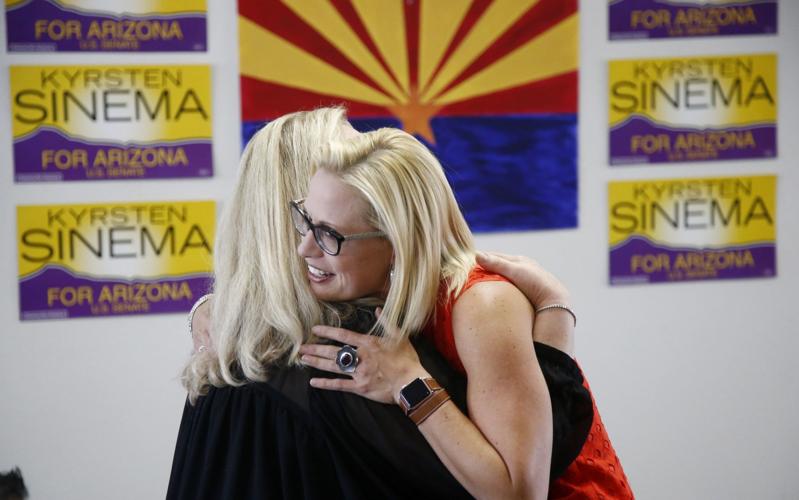PHOENIX — U.S. Rep. Martha McSally won the Republican nomination Tuesday for Arizona’s U.S. Senate seat, setting up a November contest with Democratic U.S. Rep. Kyrsten Sinema.
Republicans picked the candidate backed by the party establishment and seen by analysts as the GOP’s best chance at holding the open seat in what is shaping up to be a difficult general election for the party.
McSally, a former Air Force colonel who represents a Tucson-area swing district and was the first woman to fly a jet in combat, defeated former state Sen. Kelli Ward and former Maricopa County Sheriff Joe Arpaio.
Barb Ruguone, 78, cast her ballot Tuesday for McSally at a Phoenix library. “She seems like she’d be the most upfront, the most forward. It seems like she wouldn’t be intimidated,” Ruguone said.
McSally and Sinema both want the seat being vacated by Republican Sen. Jeff Flake, who is retiring.
The primary happened in the shadow of the death of Arizona’s senior senator, John McCain, whose body will lie at the Arizona Capitol on Wednesday. Both nominees have pledged in his honor not to campaign then or Thursday.
In a prepared statement, Sinema mentioned McCain, who was known for bucking his party. “It’s up to all of us to follow his lead of always putting country over party,” she said.
McSally began her victory speech with a moment of silence for McCain. “It’s difficult to celebrate anything this week,” she said before starting her speech, in which she tied Sinema to House Minority Leader Nancy Pelosi.
Arizona has an open Senate seat this cycle after Flake decided to leave office. The seat is considered a key pickup for Democrats in their bid to take control of the chamber, meaning the general election will be among the closest-watched Senate races between now and November.
Television ads have already bombarded Arizona residents throughout the summer months, and a competitive general election is likely to draw in millions of dollars in outside spending for television ads and other campaigning.
Sinema was long favored to win the primary; she breezed past civil-rights attorney Deedra Abboud, whose left-leaning campaign gained little traction.
Sinema is also seen as a competitive Democratic candidate in a general election that could hinge on how voters feel about President Trump and his policies. While her centrist approach and Blue Dog Democrat status may not appeal to the state’s voters who are far to the left, her willingness to be bipartisan could curry favor among the state’s large crop of independent voters. If she’s victorious, Democrats could pick up an Arizona Senate seat for the first time since Dennis DeConcini of Tucson left office in 1995.
In a state whose electoral votes went to Trump, the Republican nominee could use voters’ support for Trump to her advantage. McSally, Ward and Arpaio all campaigned on their various connections to Trump during the primary.
In mid-August, McSally’s campaign boasted about the president calling her “terrific” while introducing her at an event.
Meanwhile, Ward was endorsed by former Trump adviser Steve Bannon, and Arpaio noted his early support for Trump.
The Republican candidates also distanced themselves from the ailing McCain, who died after most ballots had been cast by early voters. McSally drew criticism from McCain’s family when she did not mention his name in the signing of a recent defense bill, which was named after McCain. Hours before McCain died on Saturday, Ward suggested in a since-deleted Facebook post that his family had announced he was ending medical treatment to hurt her campaign.
A Democratic victory in the Senate race could suggest the state could be up for grabs in 2020. Bill Clinton was the last Democratic presidential nominee to carry Arizona, in 1996.





